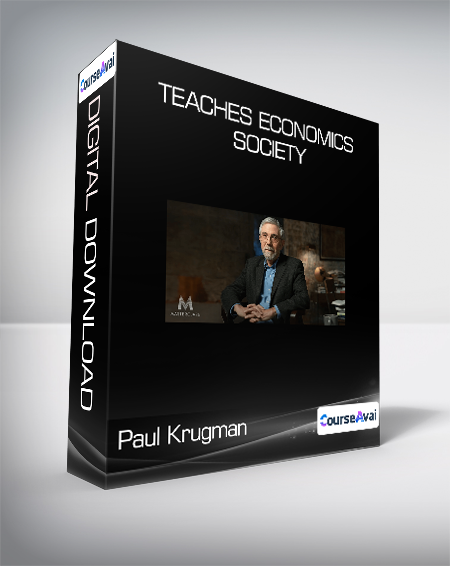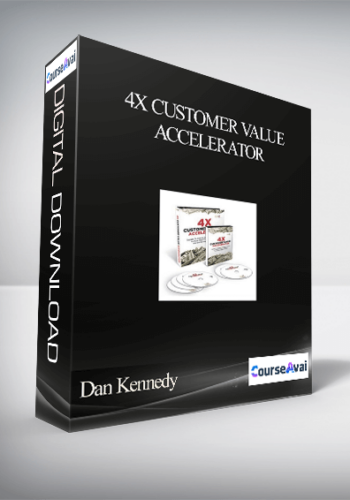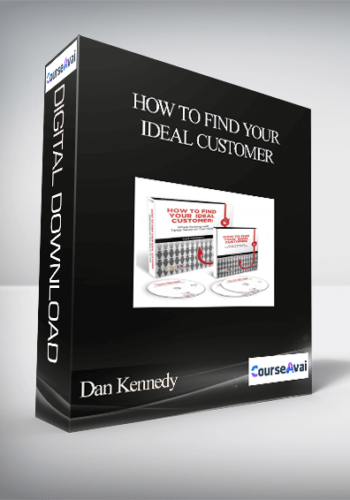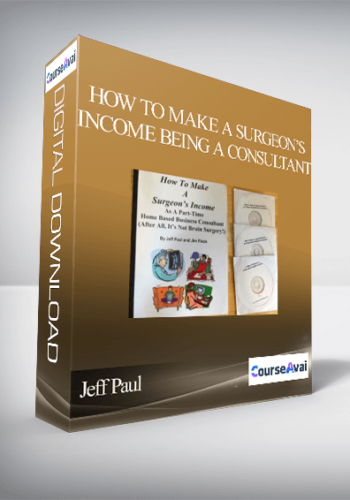Paul Krugman – Teaches Economics & Society
Original price was: $180.00.$34.20Current price is: $34.20.
Paul ends his class with parting advice for aspiring activists and policy makers, or those who wish to become more informed citizens: remember to stay aware, to read, to listen, and to remain an active participant in society.
Description
Unlock your potential with the Unlock your potential with the Paul Krugman - Teaches Economics & SocietyPaul Krugman - Teaches Economics & Society course for only course for only Original price was: $180.00.Original price was: $180.00.$$34.2034.20Current price is: $34.20.Current price is: $34.20. at at Giolib.comGiolib.com! Explore our comprehensive library of over 60,000 downloadable digital courses across various ! Explore our comprehensive library of over 60,000 downloadable digital courses across various Business & SalesBusiness & Sales. Get expert-led, self-paced learning at up to 80% savings. Elevate your skills today!. Get expert-led, self-paced learning at up to 80% savings. Elevate your skills today!
Paul Krugman – Teaches Economics & Society
For Nobel Prize-winner Paul Krugman, economics is not a set of answers—it’s a way of understanding the world. In his economics MasterClass, Paul teaches you the principles that shape political and social issues, including access to health care, the tax debate, globalization, and political polarization. Heighten your ability to read between the lines and decipher the underlying economics at play.For Nobel Prize-winner Paul Krugman, economics is not a set of answers—it’s a way of understanding the world. In his economics MasterClass, Paul teaches you the principles that shape political and social issues, including access to health care, the tax debate, globalization, and political polarization. Heighten your ability to read between the lines and decipher the underlying economics at play.
Topics covered in classTopics covered in class
Each class includes an in-depth, downloadable workbook.Each class includes an in-depth, downloadable workbook.
1. Introduction
1. Introduction
Meet your new instructor: Nobel Prize-winning economist Paul Krugman. Paul will cover many of the issues you see in the headlines everyday—and provide tools to help you make sense of it all.Meet your new instructor: Nobel Prize-winning economist Paul Krugman. Paul will cover many of the issues you see in the headlines everyday—and provide tools to help you make sense of it all.
2. What Is Economics?
2. What Is Economics?
Paul believes that at its heart, economics is about people—how they earn a living and how they spend their income.Paul believes that at its heart, economics is about people—how they earn a living and how they spend their income.
3. Two Fundamental Principles of Economics
3. Two Fundamental Principles of Economics
First—people respond to incentives. Second—each transaction has an equal give and take. Paul breaks down economic thinking into two main principles and teaches you the intricacies of each.First—people respond to incentives. Second—each transaction has an equal give and take. Paul breaks down economic thinking into two main principles and teaches you the intricacies of each.
4. Major Developments in Economic Thought
4. Major Developments in Economic Thought
Paul walks you through the history of economic thought through the theories of Adam Smith and John Maynard Keynes to make an important point—you have to understand the past to improve the future.Paul walks you through the history of economic thought through the theories of Adam Smith and John Maynard Keynes to make an important point—you have to understand the past to improve the future.
5. Understanding Macroeconomics: The Fed and IS-LM (Wonkish)
5. Understanding Macroeconomics: The Fed and IS-LM (Wonkish)
Learn how the Federal Reserve works to keep the economy healthy, and about the theoretical framework it uses to inform its decisions.Learn how the Federal Reserve works to keep the economy healthy, and about the theoretical framework it uses to inform its decisions.
6. How ‘08 Happened
6. How ‘08 Happened
Learn about the market patterns and unregulated financial activities that led to our worst financial crisis since the Great Depression, and how to prepare yourself for the uncertain economic future.Learn about the market patterns and unregulated financial activities that led to our worst financial crisis since the Great Depression, and how to prepare yourself for the uncertain economic future.
7. The Economic Theory of Crises
7. The Economic Theory of Crises
Learn how these concepts played out in Japan’s 1998 crash and the 2008 recession in the US.Learn how these concepts played out in Japan’s 1998 crash and the 2008 recession in the US.
8. Economic Solutions to Crises
8. Economic Solutions to Crises
Paul details monetary solutions vs. fiscal solutions, how to rethink deficit spending, and what to do to brace for the next crisis.Paul details monetary solutions vs. fiscal solutions, how to rethink deficit spending, and what to do to brace for the next crisis.
9. Inequality: The Growing Gap
9. Inequality: The Growing Gap
The growing income gap poses a danger to the well-being of our economy. Learn the history of economic inequality, how race is always related, and the economic effects of growing up boomer vs. growing up millennial.The growing income gap poses a danger to the well-being of our economy. Learn the history of economic inequality, how race is always related, and the economic effects of growing up boomer vs. growing up millennial.
10. Inequality: Our Divided Society
10. Inequality: Our Divided Society
Learn the social and cultural costs of our inequality, and ways to advocate for a more equal society.Learn the social and cultural costs of our inequality, and ways to advocate for a more equal society.
11. Understanding Taxes
11. Understanding Taxes
Paul explores the data behind “supply side” taxation, the potential impact of the 2017 tax cuts, and how the American tax plan affects each of us.Paul explores the data behind “supply side” taxation, the potential impact of the 2017 tax cuts, and how the American tax plan affects each of us.
12. The Economics of Technological Progress
12. The Economics of Technological Progress
Learn the impact of technological expansion on the job market, the economy as a whole, and on the individual citizen.Learn the impact of technological expansion on the job market, the economy as a whole, and on the individual citizen.
13. Health Care: The Problems
13. Health Care: The Problems
Health care is central to American lives and the American economy. Paul breaks down the economics of the private health care market and explains two “market killers” in our current system.Health care is central to American lives and the American economy. Paul breaks down the economics of the private health care market and explains two “market killers” in our current system.
14. Health Care: The Solutions
14. Health Care: The Solutions
Using examples from health care systems in the UK, Canada, and Switzerland, Paul examines three approaches to universal healthcare, noting the positives and challenges of each.Using examples from health care systems in the UK, Canada, and Switzerland, Paul examines three approaches to universal healthcare, noting the positives and challenges of each.
15. Theories of Trade (Wonkish)
15. Theories of Trade (Wonkish)
Through a discussion of his Nobel Prize-winning idea, the New Trade Theory, Paul explains the history and continued impact of trade on the economy.Through a discussion of his Nobel Prize-winning idea, the New Trade Theory, Paul explains the history and continued impact of trade on the economy.
16. Understanding the Hyperglobalized World
16. Understanding the Hyperglobalized World
Globalization has forever changed the way we communicate and do business. Paul discusses the transformative technologies that led to efficient global trade and the impact of those developments on our country’s economy.Globalization has forever changed the way we communicate and do business. Paul discusses the transformative technologies that led to efficient global trade and the impact of those developments on our country’s economy.
17. China: The Disruptive Miracle
17. China: The Disruptive Miracle
Get Get Paul Krugman – Teaches Economics & Society download
Paul explains China’s rapid economic growth and details how the influx of their exported goods impact economies and rules of trade worldwide.Paul explains China’s rapid economic growth and details how the influx of their exported goods impact economies and rules of trade worldwide.
18. Economic Geography
18. Economic Geography
Through the example of Silicon Valley, Paul illustrates how economics can even control the geographic movement of people.Through the example of Silicon Valley, Paul illustrates how economics can even control the geographic movement of people.
19. Reading Economics
19. Reading Economics
Paul teaches you how to read and interpret developing economic issues in order to stay informed. Learn his personal tools and techniques for spotting critical, accurate information in breaking news.Paul teaches you how to read and interpret developing economic issues in order to stay informed. Learn his personal tools and techniques for spotting critical, accurate information in breaking news.
20. Seeing the World Like an Economist
20. Seeing the World Like an Economist
For Paul, being an economist requires thinking critically and learning from others. Learn his critical thinking methodology, like how to look for natural experiments, think past your own bias, and use the information at your fingertips.For Paul, being an economist requires thinking critically and learning from others. Learn his critical thinking methodology, like how to look for natural experiments, think past your own bias, and use the information at your fingertips.
21. Writing Economics
21. Writing Economics
Using his column “Myths of Austerity,” Paul demonstrates how he uses language, current events, and more to break down a complex topic while keeping the reader informed and engaged.Using his column “Myths of Austerity,” Paul demonstrates how he uses language, current events, and more to break down a complex topic while keeping the reader informed and engaged.
22. Closing
22. Closing
Paul ends his class with parting advice for aspiring activists and policy makers, or those who wish to become more informed citizens: remember to stay aware, to read, to listen, and to remain an active participant in society.Paul ends his class with parting advice for aspiring activists and policy makers, or those who wish to become more informed citizens: remember to stay aware, to read, to listen, and to remain an active participant in society.
Future-proof your knowledge with the Future-proof your knowledge with the Paul Krugman - Teaches Economics & SocietyPaul Krugman - Teaches Economics & Society course at course at GiOlibGiOlib! Enjoy lifetime access to high-quality digital content, crafted to advance your career and personal development.! Enjoy lifetime access to high-quality digital content, crafted to advance your career and personal development.
- Lifetime Access:Lifetime Access: Permanent access to all purchased courses. Permanent access to all purchased courses.
- Smart Savings:Smart Savings: Benefit from prices up to 80% off original course costs. Benefit from prices up to 80% off original course costs.
- Safe Transactions:Safe Transactions: Process your payments securely. Process your payments securely.
- Practical Insights:Practical Insights: Gain actionable skills relevant to today's demands. Gain actionable skills relevant to today's demands.
- Instant Availability:Instant Availability: Begin your course immediately after payment. Begin your course immediately after payment.
- Flexible Learning:Flexible Learning: Access content effortlessly on any device. Access content effortlessly on any device.
Start expanding your horizons with Start expanding your horizons with GiOlibGiOlib!!






